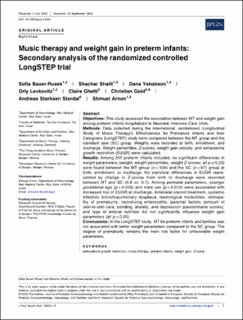| dc.description.abstract | Objectives
This study assessed the association between MT and weight gain among preterm infants hospitalized in Neonatal Intensive Care Units.
Methods
Data collected during the international, randomized, Longitudinal Study of Music Therapy's Effectiveness for Premature Infants and their Caregivers (LongSTEP) study were compared between the MT group and the standard care (SC) group. Weights were recorded at birth, enrollment, and discharge. Weight percentiles, Z-scores, weight gain velocity, and extrauterine growth restriction (EUGR) were calculated.
Results
Among 201 preterm infants included, no significant differences in weight parameters (weight, weight percentiles, weight Z-scores; all p ≥ 0.23) were found between the MT group (n = 104) and the SC (n = 97) group at birth, enrollment, or discharge. No statistical differences in EUGR represented by change in Z-scores from birth to discharge were recorded between MT and SC (0.8 vs. 0.7). Among perinatal parameters, younger gestational age (p = 0.005) and male sex (p = 0.012) were associated with increased risk of EUGR at discharge. Antenatal steroid treatment, systemic infection, bronchopulmonary dysplasia, neurological morbidities, retinopathy of prematurity, necrotizing enterocolitis, parental factors (amount of skin-to-skin care, bonding, anxiety, and depression questionnaire scores), and type of enteral nutrition did not significantly influence weight gain parameters (all p > 0.05).
Conclusions
In the LongSTEP study, MT for preterm infants and families was not associated with better weight parameters compared to the SC group. The degree of prematurity remains the main risk factor for unfavorable weight parameters. | en_US |

